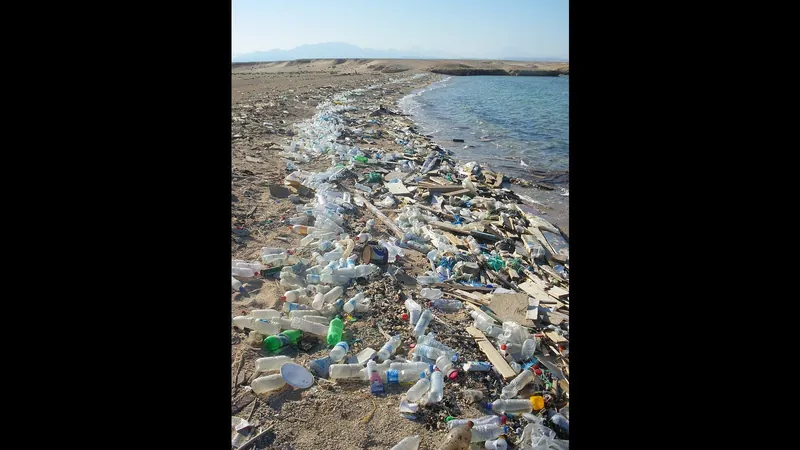
The Plastic Crisis: A Dire Threat to Humanity and Our Planet, Says New Lancet Study
2025-08-28
Author: Nur
A Global Emergency: The Plastics Crisis Unveiled
In a groundbreaking review published on August 3, *The Lancet* declares, "The world is in a plastics crisis." This compelling study, spearheaded by paediatrician and epidemiologist Professor Philip J. Landrigan alongside a diverse team, highlights the staggering implications of plastic pollution on human and environmental health.
A Hidden Danger: The Cost of Plastic
The authors issue a chilling warning: "Plastics pose a grave, growing, and largely unrecognized threat to human and planetary health"—leading to health-related economic losses exceeding a staggering $1.75 trillion annually. The relentless surge in global plastic production is identified as the core issue, skyrocketing from under 2 megatonnes in 1950 to a jaw-dropping 475 megatonnes in 2022.
The Ubiquity of Plastic: Convenience at a Cost
Described as "the defining material of our age," plastics are praised for their flexibility and affordability but criticized for their hidden economic burdens on societies. At least 16,000 chemicals are employed in plastic manufacturing, many linked to alarming health risks throughout life stages. This chemical cocktail not only extends the lifespan of plastic products but also their toxic waste.
Environmental Catastrophe: The Scale of the Problem
As plastic production continues to rise, so does plastic waste—with projections suggesting a near tripling of plastic output by 2060 without strategic intervention. The review identifies single-use plastics, like bags, bottles, and food wrappers, as primary culprits contributing to an insidious environmental crisis.
Health Impacts: A Disproportionate Burden
The study reveals that the most vulnerable populations disproportionately bear the brunt of plastic pollution. Working-class communities often find themselves living near polluted environments, enduring the worst air quality and exposure to harmful waste from plastic production facilities.
A Call to Action: Mitigating the Crisis
Despite the crucial understanding of plastic's harmful effects dating back decades, the review emphasizes that systemic change is needed to combat the escalating plastics crisis. Although recycling efforts have been deemed insufficient—less than 10% of plastic is recycled—new policies focusing on transparency and stringent regulation could pave the way toward mitigating this threat.
Global Implications: A Standoff at the UN
Timed with critical UN negotiations, which aimed to establish a landmark treaty to combat plastic pollution, the study underscores the failure to secure a meaningful agreement. As discussions faltered, divisions emerged over whether to prioritize reducing plastic production or pollution, revealing deep economic interests at play.
A Vision for the Future: The Path Forward
In its concluding remarks, the Lancet review asserts that the escalation of plastic-related harms is not an unavoidable fate. It advocates for comprehensive reform backed by robust evidence-based policies to ensure the sustainable management of plastics. However, the authors' hope relies on challenging the profit-driven motives of corporations and advocating for a more equitable global structure.
The Fight Against Plastic Pollution Begins
The findings of this study serve as both a warning and a rallying cry for action. Scientists, advocates, and communities must unite against the capitalist systems that prioritize profits over planetary and human health. The time to act is now—before plastics become an irreversible scar on our planet.


 Brasil (PT)
Brasil (PT)
 Canada (EN)
Canada (EN)
 Chile (ES)
Chile (ES)
 Česko (CS)
Česko (CS)
 대한민국 (KO)
대한민국 (KO)
 España (ES)
España (ES)
 France (FR)
France (FR)
 Hong Kong (EN)
Hong Kong (EN)
 Italia (IT)
Italia (IT)
 日本 (JA)
日本 (JA)
 Magyarország (HU)
Magyarország (HU)
 Norge (NO)
Norge (NO)
 Polska (PL)
Polska (PL)
 Schweiz (DE)
Schweiz (DE)
 Singapore (EN)
Singapore (EN)
 Sverige (SV)
Sverige (SV)
 Suomi (FI)
Suomi (FI)
 Türkiye (TR)
Türkiye (TR)
 الإمارات العربية المتحدة (AR)
الإمارات العربية المتحدة (AR)